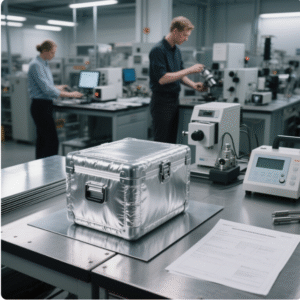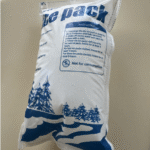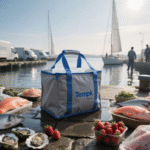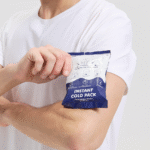Da die globalen Temperaturen steigen und sich die Lieferketten über Kontinente erstrecken, Der Bedarf an präziser Temperaturregelung war noch nie so groß. From life-saving vaccines to farm-fresh produce, the stakes of maintaining product integrity are high. Custom thermal bags have emerged as unsung heroes in this battle, offering scalable, sustainable solutions that bridge gaps in traditional cold chain logistics.

The Rising Cost of Temperature Failures
Fast 25% of pharmaceutical products and 20% of perishable foods are lost annually due to inadequate temperature management, costing industries over $35 Milliarde. In der Zwischenzeit, conventional methods like refrigerated trucks and polystyrene coolers contribute to 8% of global carbon emissions. These challenges are compounded by last-mile delivery complexities, where temperature fluctuations are most likely to occur.
Custom thermal bags address these pain points by:
-
Slashing Energy Use: Passive insulation reduces reliance on fuel-guzzling refrigeration.
-
Minimizing Waste: Wiederverwendbare Designs ersetzen Einwendungskunststoffe, aligning with EU and UN sustainability mandates.
-
Ensuring Compliance: Meeting strict regulatory standards (Z.B., WHO’s EPI for vaccines).
Tempks Wärme -Taschen: Engineering Tomorrow’s Cold Chain
Tempk, a trailblazer in thermal technology, has reimagined custom thermal bags with its GuardianX Series, blending cutting-edge innovation with practicality:
1. Military-Grade Insulation
Verwendung aerogel composite layers Und Bio-basierte Phasenwechselmaterialien (PCMs), Tempk’s bags maintain temperatures between -30°C and 50°C for up to 72 hours—ideal for transcontinental shipments. Unabhängige Tests zeigen a 40% improvement over traditional EPS foam in extreme heat.
2. Intelligente Konnektivität
Embedded IoT sensors track real-time temperature, Luftfeuchtigkeit, und Schockniveaus, syncing data to cloud platforms via Bluetooth. Logistics managers receive instant alerts for deviations, while end customers can verify conditions via QR codes—a feature praised during COVID-19 vaccine distribution.
3. Circular Economy Focus
-
Materialien: Gebaut von 100% ocean-bound recycled plastics and toxin-free liners.
-
Modularität: Interchangeable parts allow easy repairs, extending product life by 300%.
-
End-of-Life: Tempk’s buyback program grinds retired bags into raw material for new products.
4. Tailored for Versatility
-
Medizinischer Gebrauch: Lockable compartments for sensitive biologics, compliant with IATA air transport regulations.
-
Food Sector: Antibacterial liners and leak-proof seams for seafood and dairy.
-
E-Commerce: Branded designs with ergonomic handles, boosting customer unboxing experiences.
Die Straße voraus: Schlau, Grün, and Customer-Centric
With governments enforcing stricter cold chain regulations (Z.B., FDA -FSMA -Regel 204), businesses are pivoting toward agile, umweltfreundliche Lösungen. Tempk’s thermal bags exemplify this shift, Angebot:
-
Carbon Neutrality: Jede Tasche fällt aus 15 kg CO2 jährlich durch materielle Auswahlmöglichkeiten.
-
Data-Driven Trust: 95% of clients report fewer compliance disputes using Tempk’s digital logs.
-
Markentreue: Customizable exteriors increase brand recall by 50%, per a 2024 logistics survey.
Abschluss
Custom thermal bags are no longer mere packaging—they’re strategic tools for resilient, responsible cold chains. Tempk’s GuardianX Series leads this evolution, proving that sustainability and performance can coexist. As climate risks escalate, adopting such innovations isn’t just smart business; it’s a commitment to safeguarding both products and the planet.























